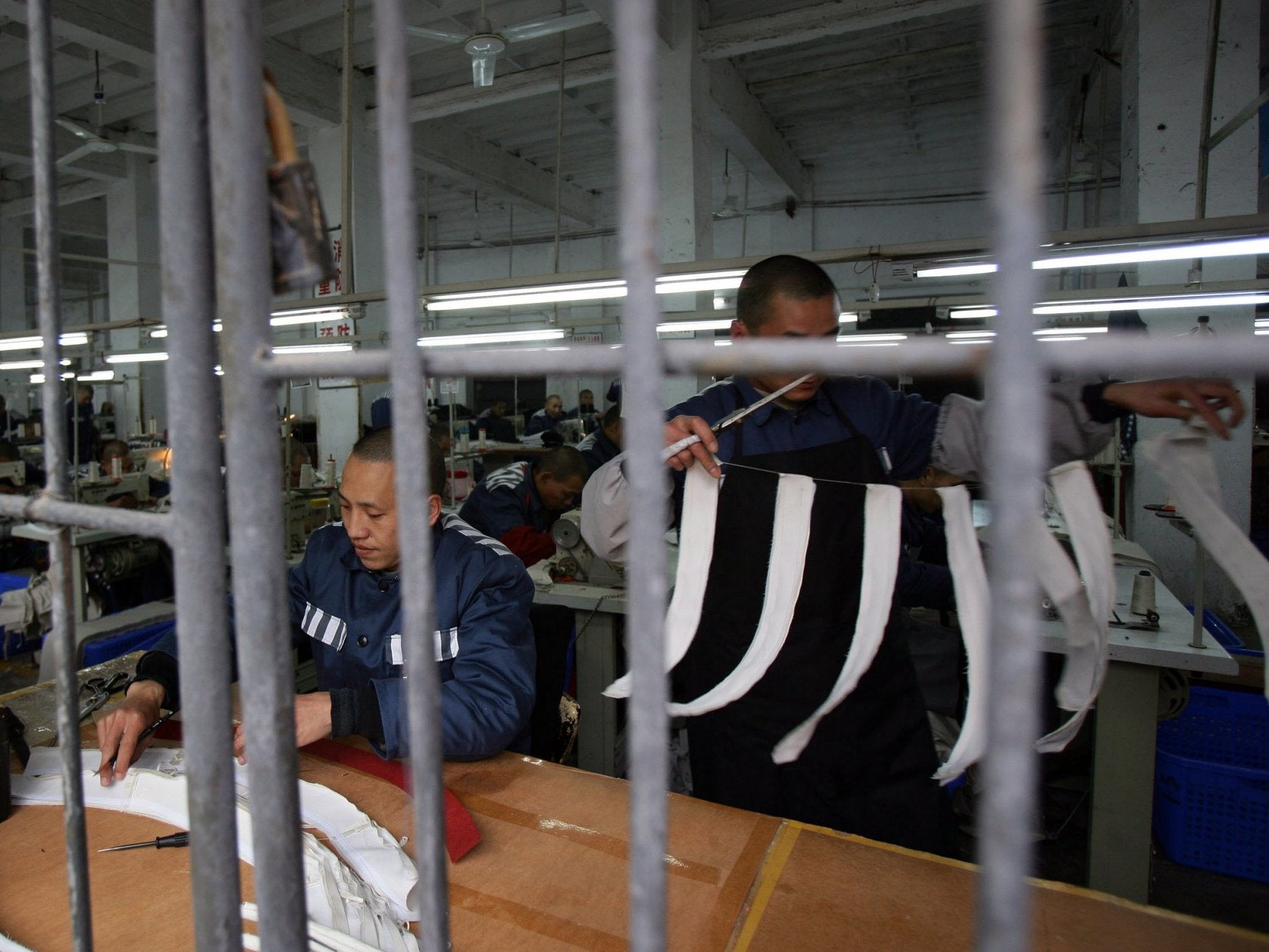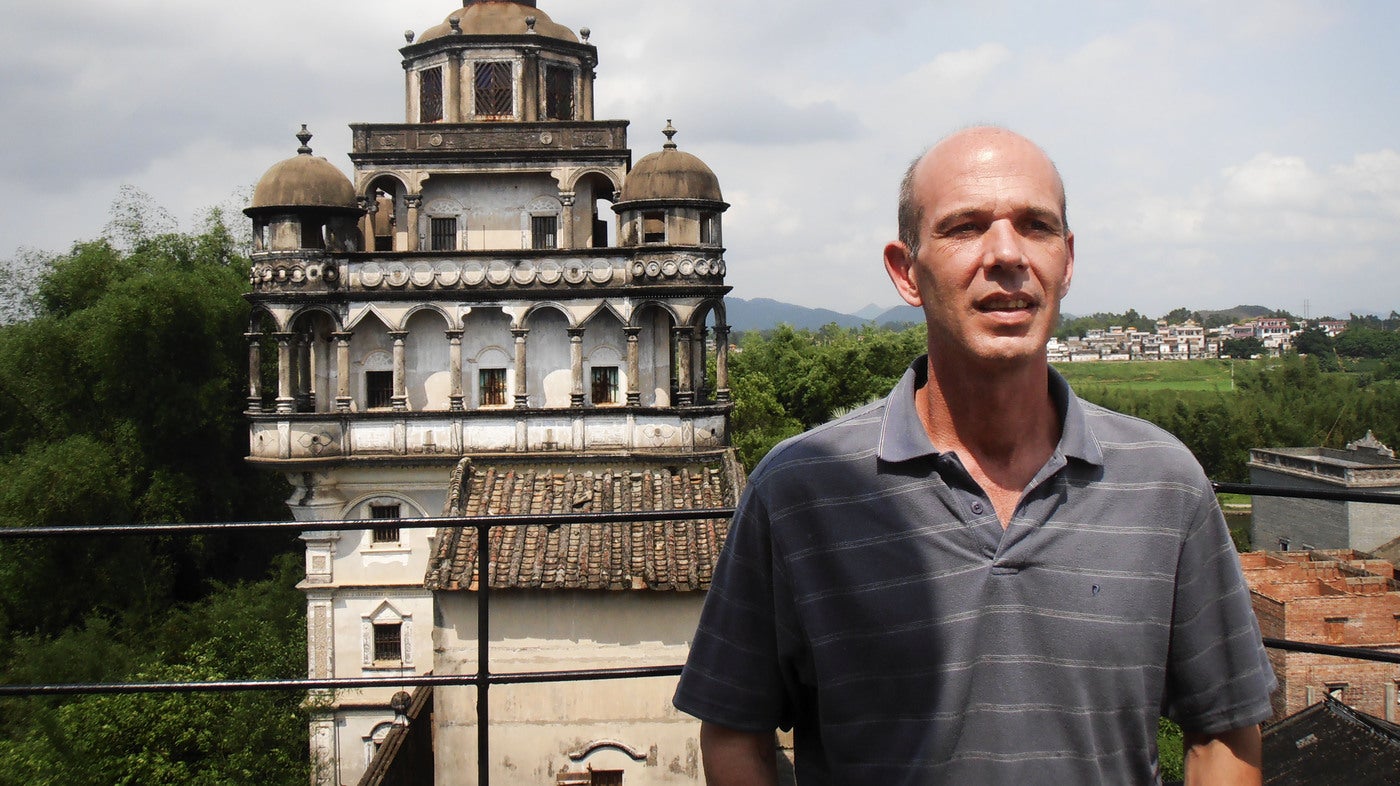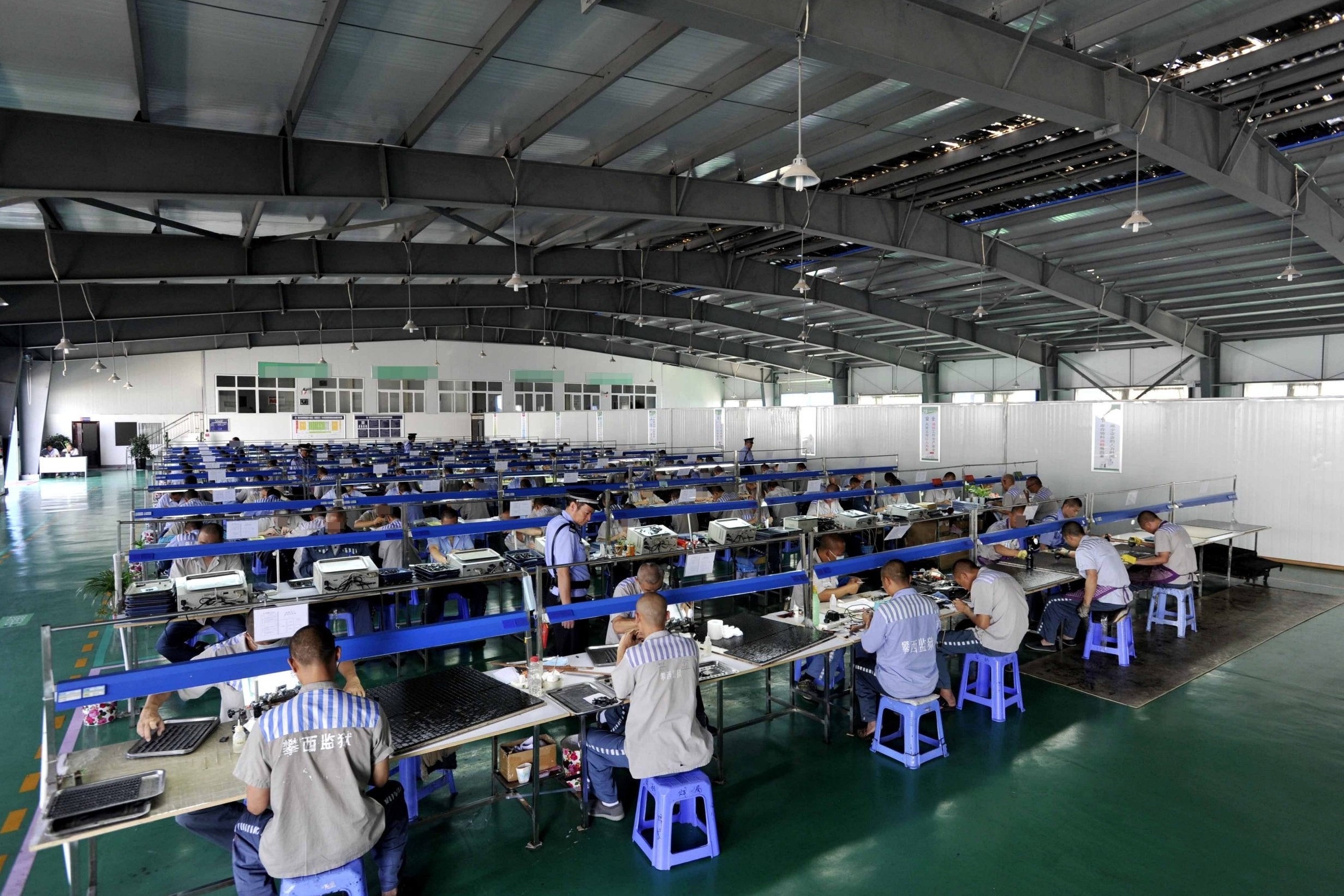How inmates in Chinese prisons are forced to make the world's Christmas decorations
Ex-inmate and sociology professor Stuart Foster says: ‘They whipped people with the Christmas light cords. I you pick up a fairy light cord, chances are it could have been used to beat someone’

Your support helps us to tell the story
From reproductive rights to climate change to Big Tech, The Independent is on the ground when the story is developing. Whether it's investigating the financials of Elon Musk's pro-Trump PAC or producing our latest documentary, 'The A Word', which shines a light on the American women fighting for reproductive rights, we know how important it is to parse out the facts from the messaging.
At such a critical moment in US history, we need reporters on the ground. Your donation allows us to keep sending journalists to speak to both sides of the story.
The Independent is trusted by Americans across the entire political spectrum. And unlike many other quality news outlets, we choose not to lock Americans out of our reporting and analysis with paywalls. We believe quality journalism should be available to everyone, paid for by those who can afford it.
Your support makes all the difference.Flanked by large, grey, windowless walls, the Baiyun District Detention Centre is an ominous-looking building situated on the edge of Guangzhou, a city in China’s southern Guangdong province.
Like many other detention facilities and secret “black jails” located across the country, it is used to house anyone from convicted murderers on Death Row, to petty criminals, and those arbitrarily detained without trial for crimes of what the government terms “civil disobedience”.
Few on the outside know what takes place within these walls. The information we have on their role in a global supply chain, which uses forced labour and torture to produce much of the fairy lights, baubles, Christmas cards and other festive decorations supplied to major brands across the western world, comes from various activist groups within the country, and the stories of former inmates.
One such ex-inmate is Stuart Foster, a middle-aged sociology professor from South Carolina, who is believed to be the only western man to have endured forced labour inside the Chinese prison camp system. Known as Prisoner 13H1741, Foster spent nine months inside the Baiyun Detention Centre, where among other cellmates he was forced to assemble thousands of Christmas lights every day, destined for Europe and North America.
“Like me, many prisoners had been detained without trial, and they would be released after a few days or months, but it didn’t matter if you were guilty or not, you were going to work in there,” says Foster, who no longer lives in China and prefers not to publicly disclose his current location.
“If you were Chinese and you refused to work, they would beat you straight up, without hesitation.”
Foster had been accused of fraud, an incident he describes as a major misunderstanding, while working as a lecturer at Guangdong University of Foreign Studies. After being arrested by the Public Security Bureau, he would spend the next 280 days confined to a cell the size of a squash court, living, sleeping and working alongside 30 other prisoners ranging from heroin smugglers, to murderers, rapists and pickpockets.
“You have nothing, no chairs or beds, just a concrete floor to sleep on,” he says. “Each day, they clap at 7am to wake you up, and then you sit in a line and chant communist slogans – ‘Make the motherland strong’, ‘Hail to the party’ – then you stand up, and do marching, and then the work comes. They come and drop fairy light bulbs, receptacles, and wires at your feet, and that was your job for the day for the next 10 hours.”

Foster explains that these systems typically function through a combination of bribery and violence. Cells are run by particularly hardened inmates, known as “bosses” who are bribed with small rewards by the prison guards to ensure that each cell produces a certain quota, usually in the tens of thousands of products per day.
“The officials in the prison were purely interested in driving production,” he says. “They would even have competitions. I was in cell B21A, and they’d tell our bosses, cell B29A assembled 60,000 Christmas lights today, and if you can assemble more than them tomorrow, you get a pack of cigarettes.”
On the other hand, failure to work hard enough would result in immediate punishment. This ranged from denial of food, to being manacled by your hands and legs to the floor for hours or days on end. Reports from other prison labour camps have revealed that those who refuse to work altogether are often placed in “hanging cuffs” – where the inmate is handcuffed and left to dangle by the wrists from the iron bars of a window – until they submit.
Foster recalls that at times whippings were so commonplace that the cell floor would be stained with the blood of inmates. “They whipped people with the Christmas light cords,” he remembers. “I don’t want to ruin people’s Christmas, but if you pick up a fairy light cord, chances are it could have been used to beat someone.”

Each year, the workload at the Baiyun Detention Centre intensifies towards the middle of summer when a major auction is held at a local trade fair, offering the stacks of Christmas merchandise to the highest bidders. After September, the production trade would simply switch and the cells would turn to producing vast quantities of Chinese New Year decorations, aimed at markets in Malaysia and Singapore.
During Foster’s time there, the guards would openly delight in the fact that the retail giants purchasing the goods had no idea of the circumstances in which they’d been made. “I got to know one of them quite well, and he would often brag about how he was dealing with Americans,” Foster remembers. “He said to me a few times, ‘I think America would be angry, if they knew these were made in prisons.’ I was like, ‘Yeah, they would.’”
* * *
China’s system of using prison camps as factories of forced labour is believed to have begun in the 1950s, when the Chinese Communist Party first assumed control of the country. But it has only been since the 1990s that the practise has become known to the wider world, largely due to the efforts of human rights researchers and activists, such as British legal scholar Robin Munro, in exposing the scale of illegal labour in China.

In particular, there was widespread outcry about China’s notorious laojiao or re-education through labour system in which people could be sentenced to prison-like conditions entirely at the discretion of police, without access to lawyers or a fair trial. But while China officially abolished the laojiao system in 2013, after years of international pressure, activists say that many of the key aspects laojiao still continue under different guises.
“Laojiao was blatantly illegal under international law,” says William Nee, a China researcher at Amnesty International. “However, forced labour still persists in detention facilities, where people are kept who’ve not yet been tried, and in actual prisons. In the past few months, the Chinese government has been trying to spin many of these detention facilities as vocational centres, where in their narrative, people are learning helpful skills which make them go up the value chain in terms of jobs. However, research has shown torture is highly prevalent, and people are essentially being forced to work.”
When Xi Jinping became president of the People’s Republic of China back in 2013, there was widespread hope that he would be a reformer, and perhaps even abolish forced labour for good. However, many suspect that instead, forced labour in prison and detention facilities has actually become far more prevalent under Xi’s leadership.

“There’s several reasons for this,” explains Chen Guangcheng, a Chinese civil rights activist, who was imprisoned for four years in various detention centres from 2006 to 2010. “Inequities in Chinese society are becoming more and more serious, so crime is on the rise and every year more and more people are going to jail. And in addition, the number of people who have had their freedom taken away from them and been placed in black jails, detention centres or house arrest has increased a lot. You can see this in many places. The detention centre near where I lived originally held 80 people. Now it holds more than 1,000. So, of course, more and more people are being subject to forced labour.”
At the same time, this growing captive workforce has proved extremely useful for the Chinese economy, which has been coming under greater pressure from Thailand, Bangladesh and other southeast Asian countries in the production of everything from textiles to Christmas trinkets. “Many of the low-wage, low-tech jobs have left China over the past ten years because of cost reasons,” Nee says. “There have been rumours that factory owners have been actively looking to switch to forced labour in detention centres to keep costs down.”
One of the reasons why it has been difficult for major brands in the western world to identify and eliminate goods made through prison labour from their supply chains is because in many ways, on the outside, many prisons and detention centres operate almost identically to genuine businesses. Some even have their own full-time sales teams, comprised of prison staff who spend their time continually pitching to factories across China, and sourcing new work.
Guangcheng points out that this is actively encouraged by the Chinese government who deliberately withhold funding from prisons and detention centres to force them to be self-sustainable, using prisoners to generate enough revenue to cover the prison’s costs. “When you look at China’s annual budget, what the party puts out as its GDP, it’ll list a certain amount for the prison system, but in reality what the prisons will actually get is much lower number,” he says. “And that difference is left for them to cover. So prisons are left with having to find funds from other avenues.”
For Stuart Foster, this rings true with much of what he witnessed. “I got the impression that the guards were constantly on a budget,” he says. “It reminded me almost like a business, where they knew they had to spend so much money on food, electricity, bribes for the cell bosses, and so they had to hit the production numbers on those Christmas lights to cover that and remain profitable.”
Such is the focus on daily and monthly quotas, that as an incentive in some prisons, sentences can even be reduced for good work. But most commonly, they are extended for perceived underperformance. “If you do your work well in a given month, then you’ll get one point, which means you have four days taken off your overall sentence,” Guangcheng says.

“But if you haven’t met your target, which is more common, then you get points deducted and sentences extended. Prison guards care only about the quotas, there’s no attention given to anything else. It’s like the prisoners are like ants. I think the thing which would horrify people most in the west is that when someone dies in a Chinese prison doing labour, no one really cares.”
* * *
Last December, Jessica Rigby, a 27-year-old from Essex, was browsing through Christmas cards in Sainsbury’s when she spotted one with a snowy penguin adorned on the outside. Opening it up, Rigby discovered a note scrawled in Mandarin.
After posting it on Facebook and asking for a translation, Rigby found that it wished her happiness and good luck, and had been signed “Third Product Shop, Guangzhou Prison, Number 6 District”.
Rigby was shocked, saying “If these cards are genuinely made by Chinese prisoners, what’s to say other things [Sainsbury’s] sell aren’t made by child labour and stuff like that?”
In recent years, many such notes which have made their way into the hands of horrified westerners after being discovered in boxes of Halloween or Christmas decorations, has led to increased pressure on retailers to try and ensure that their products are not being produced in Chinese prisons.
The fact that this still persists is largely due to the complexity and costs of doing full due diligence on Chinese suppliers. “A lot of brands pass on their orders to third-party factories, unaware that these factories then outsource all of their production to prison labour camps,” says Li Qiang, head of activist group China Labour Watch. “To actually find out whether this is going on or not would require a lot of costly work, auditing these various factories in person and trying to actively seek whether their goods are being manufactured in prisons. And at the end of the day, the brands only really care more about whether the orders are produced on time, not how they’re being made.”

Qiang says that the only way this could change is through sustained public demand, and a refusal to accept goods which have been produced cheaply in China. Foster believes one of the main reasons why this has not happened, is simply due to ignorance amongst the wider population of the scale of the horrors which take place in many Chinese prisons and detention centres.
“People have no idea to the extent of the squalor in these facilities, where these products are being produced,” he says. “One of the things which disgusted me the most on a daily basis, was the bed sores. Because you had to remain meek and stay on the floor all day long, otherwise the bosses might beat you, and you’re living and working in such a confined space, eventually inmates develop these sores all over their bodies.”
In addition, it is commonplace for inmates to be mentally impaired, which typically sees them singled out for beatings and punishment as they are unable to keep up with the required workload. Foster recalls one such boy in his cell who was beaten on a daily basis, whenever the cell bosses felt like it.
“This boy was particularly mentally challenged,” he says. “Every morning, we’d have to stand in a line, shout our numbers, and they’d play tricks on him, deliberately switching up the order, so he didn’t know what to say. And then they’d whip him.”
“We had one boss who was particularly sadistic. He’d actually taken three Christmas light cords and braided them together to make this whip, and he’d walk round, threatening and intimidating people with it. I remember this boy was sitting, maybe four, five feet away from me, and the boss came up and gave him three slashes across the back. And from where I was sitting, I could vividly see the welts forming across his skin. That’s something I’ll never forget.”
China Labour Watch feel that it is the responsibility of western governments to introduce legislation which forces major brands to do more to ensure that they are not feeding the prison labour trade, even if this does mean that consumers ultimately have to pay more for merchandise.
But in Foster’s eyes the responsibility for such atrocities ultimately lies in the hands of western consumers themselves.
“The prison labour system in China is evil, but I will state very clearly, the blood is on the hands of the consumers too,” he says. “If Americans didn’t always buy those Christmas lights, China wouldn’t produce them. So I really think a lot of the blame lies with the commercial system. There’s people I know, who buy Christmas lights, put them in the attic where they become tangled, and the following year, instead of untangling them, they’ll go buy cheap lights at the local store. Forced labour wouldn’t happen if people weren’t wanting to buy cheap trinkets.”
Join our commenting forum
Join thought-provoking conversations, follow other Independent readers and see their replies
Comments